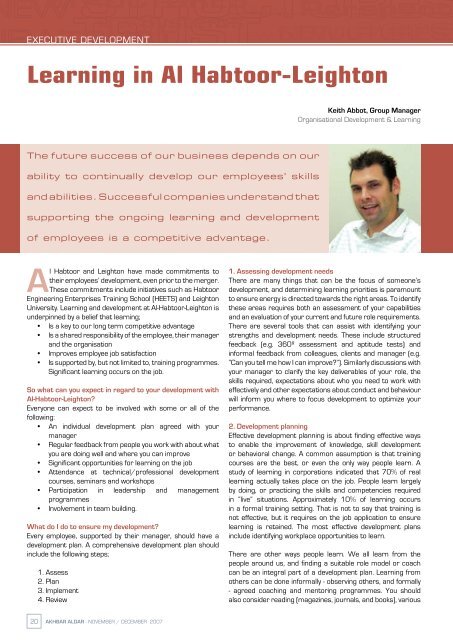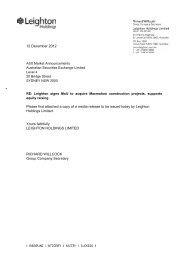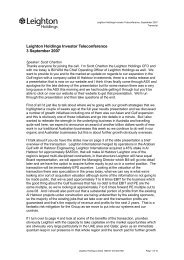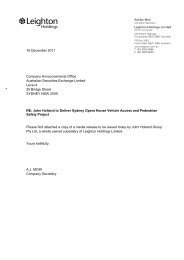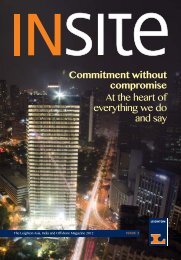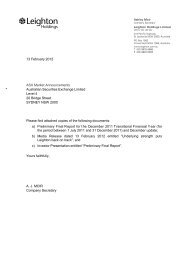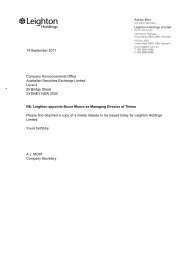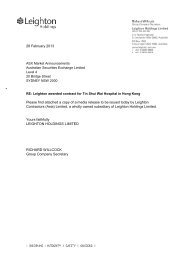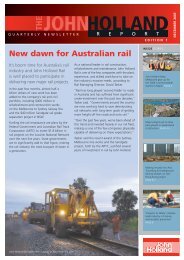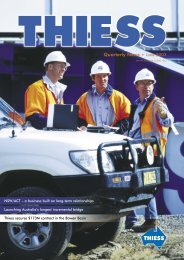THE NEWS OF AL HABTOOR LEIGHTON GROUP Dubai - UAE ...
THE NEWS OF AL HABTOOR LEIGHTON GROUP Dubai - UAE ...
THE NEWS OF AL HABTOOR LEIGHTON GROUP Dubai - UAE ...
Create successful ePaper yourself
Turn your PDF publications into a flip-book with our unique Google optimized e-Paper software.
NEW Perspecti<br />
EXECUTIVE DEVELOPMENT<br />
Learning in Al Habtoor-Leighton<br />
Keith Abbot, Group Manager<br />
Organisational Development & Learning<br />
The future success of our business depends on our<br />
ability to continually develop our employees’ skills<br />
and abilities. Successful companies understand that<br />
supporting the ongoing learning and development<br />
of employees is a competitive advantage.<br />
Al Habtoor and Leighton have made commitments to<br />
their employees’ development, even prior to the merger.<br />
These commitments include initiatives such as Habtoor<br />
Engineering Enterprises Training School (HEETS) and Leighton<br />
University. Learning and development at Al-Habtoor-Leighton is<br />
underpinned by a belief that learning;<br />
• Is a key to our long term competitive advantage<br />
• Is a shared responsibility of the employee, their manager<br />
and the organisation<br />
• Improves employee job satisfaction<br />
• Is supported by, but not limited to, training programmes.<br />
Significant learning occurs on the job.<br />
So what can you expect in regard to your development with<br />
Al-Habtoor-Leighton?<br />
Everyone can expect to be involved with some or all of the<br />
following:<br />
• An individual development plan agreed with your<br />
manager<br />
• Regular feedback from people you work with about what<br />
you are doing well and where you can improve<br />
• Significant opportunities for learning on the job<br />
• Attendance at technical/professional development<br />
courses, seminars and workshops<br />
• Participation in leadership and management<br />
programmes<br />
• Involvement in team building.<br />
What do I do to ensure my development?<br />
Every employee, supported by their manager, should have a<br />
development plan. A comprehensive development plan should<br />
include the following steps;<br />
1. Assess<br />
2. Plan<br />
3. Implement<br />
4. Review<br />
1. Assessing development needs<br />
There are many things that can be the focus of someone’s<br />
development, and determining learning priorities is paramount<br />
to ensure energy is directed towards the right areas. To identify<br />
these areas requires both an assessment of your capabilities<br />
and an evaluation of your current and future role requirements.<br />
There are several tools that can assist with identifying your<br />
strengths and development needs. These include structured<br />
feedback (e.g. 360º assessment and aptitude tests) and<br />
informal feedback from colleagues, clients and manager (e.g.<br />
“Can you tell me how I can improve?”). Similarly discussions with<br />
your manager to clarify the key deliverables of your role, the<br />
skills required, expectations about who you need to work with<br />
effectively and other expectations about conduct and behaviour<br />
will inform you where to focus development to optimize your<br />
performance.<br />
2. Development planning<br />
Effective development planning is about finding effective ways<br />
to enable the improvement of knowledge, skill development<br />
or behavioral change. A common assumption is that training<br />
courses are the best, or even the only way people learn. A<br />
study of learning in corporations indicated that 70% of real<br />
learning actually takes place on the job. People learn largely<br />
by doing, or practicing the skills and competencies required<br />
in “live” situations. Approximately 10% of learning occurs<br />
in a formal training setting. That is not to say that training is<br />
not effective, but it requires on the job application to ensure<br />
learning is retained. The most effective development plans<br />
include identifying workplace opportunities to learn.<br />
There are other ways people learn. We all learn from the<br />
people around us, and finding a suitable role model or coach<br />
can be an integral part of a development plan. Learning from<br />
others can be done informally - observing others, and formally<br />
- agreed coaching and mentoring programmes. You should<br />
also consider reading (magazines, journals, and books), various<br />
20 AKHBAR <strong>AL</strong>DAR - NOVEMBER / DECEMBER 2007


